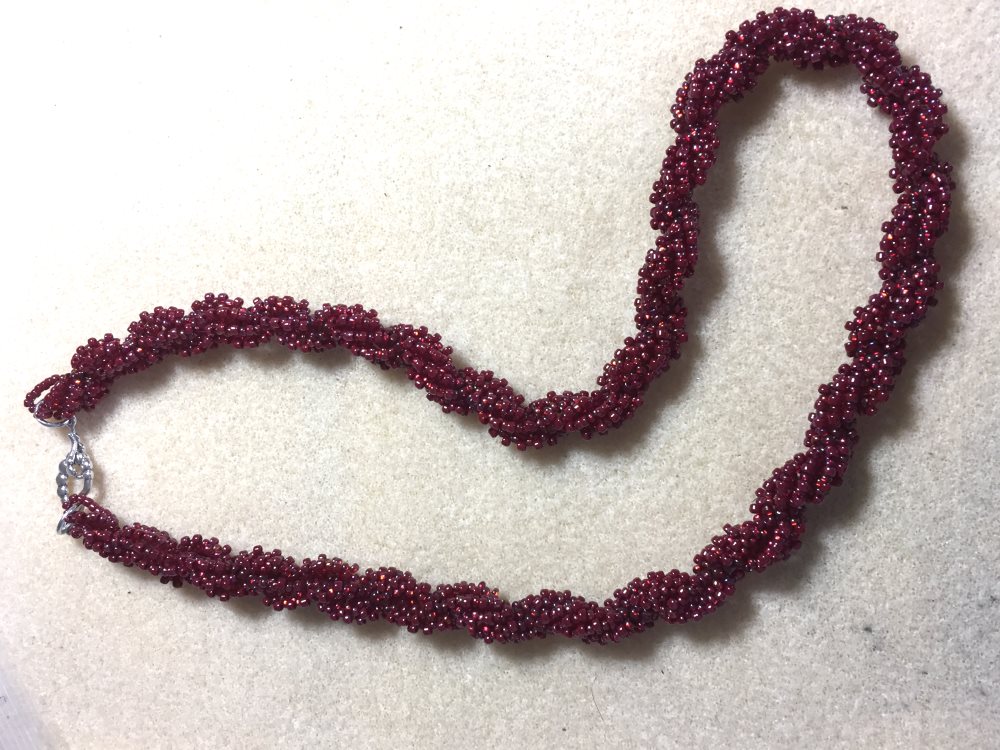
Good morning, challengers! I’ve got a few updates for you before diving into the meat of today’s post. LeechBlock is working out fantastic for me, and I also managed to get my main compy up to speed, too. Huzzah! Sadly, I am forced (forced, I tell you!) to suffer in domesticity, but thanks to February’s ORGANIZE theme my spring cleaning is going a lot smoother than last year. The habits I picked up on are allowing me to gauge how much time a household task takes; this gives me more options to plan my day.
I’ve been bead stitching for my artistic time, and I recently finished this spiral stitch necklace with peyote embellishments. The pattern is available in Jill Weisman’s Beautiful Beaded Ropes–I loved the red so much I didn’t deviate from the color scheme or the original pattern.

Also in hilarious news, I backed the Chameleon Pens Color Tops Kickstarter and didn’t realize that my pledge was specific to the “tops.” A few e-mails and updates later, and I’m the (future) proud owner of alcohol-based markers!
For today’s check-in, I want to talk about emotional labor and its impact on your productivity.
Creative Challenge: Dealing with Emotional Labor
Emotional labor is defined on Wikipedia as: “..a form of emotion regulation that creates a publicly visible facial and bodily display within the workplace. The related term emotion work (also called “emotion management”) refers to “these same acts done in a private context,” such as within the private sphere of one’s home or interactions with family and friends. Hochschild identified three emotion regulation strategies: cognitive, bodily, and expressive.”
Artists perform emotional labor because we tap into the human condition to produce art that generates a desired feeling (e.g. happiness, fear, awe) or response (e.g. sexual arousal in romance) when we create our art, sell it, and interact with our readers, players, etc. If we (e.g. artists) lived in a bubble, unaffected by the outside world, you might think it’d be easier to produce works of art in any genre–humor, romance, horror, science fiction, fantasy, mystery, thriller–on command. It’s not and we don’t. In fact, to become better artists, we have to explore the human condition either consciously or subconsciously to produce art that connects emotionally. Whether we do that through our daily lives/local communities or not, we aren’t robots. We are human beings who make art, and we’re not immune to what’s happening around or to us. Due to the nature of our work, we often have to ignore or deal with our feelings so we can generate emotional touchpoints in our work.
It’s easier to put emotional labor into context offline. For example, consider a fan who asks me out to an intimate dinner at a con. In the fan’s mind, they want to do something nice and spend time with the artist they admire–which is lovely! In my mind, however, an invitation for a private one-on-one dinner with someone I’ve never met before is something I’d typically say “No, thank you!” to for a few reasons. First, when I travel it’s typically for work so I often balance my schedule against meetings, etc. Second, since I’m fairly private a lot of people don’t know I’ve been in a long-standing relationship and I don’t mix work with pleasure. And lastly, as a woman in a strange city there are safety considerations I have to weigh against an invite like this. Because I don’t want to be rude, I might say something like: “I’m very flattered, but no thank you.” Conventions are usually work for me, and I finally feel like I’ve figured it out!
Offline, emotional labor is interesting because face-to-face interactions and body language support what you’re saying. Online interactions are an entirely different ballgame because people are exchanging words and images through their “world view” filter. The internet isn’t a utopia filled with unbiased or free information, because human beings create the content that is published online. If you’re engaged, then you’re consuming updates and content that may or may not impact your emotions. The news is the easiest example I can think of, but what happens when it’s not that simple? Take, for example, a piece of bad news that’s circulating about a peer you’ve worked with. Do you keep an eye on the discussion and pay attention to every nuance? Do you defend this peer? Does this peer expect you to chime in? Do you converse with other fans to make sense of what’s happening? As another example, say that I’m writing a funny short story about kittens and it’s due in a few hours. I briefly touch base on Facebook only to find out that my friend’s beloved cat died. Ouch! How does that news affect my work? I’m sad about Booster, but I don’t have time to feel that emotion. If I want to get my short story done, I need to channel or set aside that grief for a later date.
By thinking about emotional labor as “unpaid work”, I feel this lens puts a little space between what you feel obligated to do, what you have to do, and what you can walk away from. You aren’t getting paid for the emotional labor you’re required to perform online, much like you wouldn’t get paid to smile and nod in front of hostile reviewers or back-stabbing peers. Remember: people often go where they feel welcome, but that doesn’t hold true in all cases. Sometimes, you might not have a choice and have to engage online. Instead of saying: “This [current event] might de-rail me from my deadline. How do I deal with these toxic emotions?” Try re-wording this to: “This [current event] might de-rail me from my deadline. Do I need that kind of work right now?” That way, you’re recognizing you’re adding unpaid labor on top of your regular workload, and that by itself could help you deal with difficult situations.
Lastly, I want to point out there is no possible way for me to relate to all of my readers for this (or any other) challenge, and I recognize that. This topic is a broad one, and intersects not only with productivity but with harassment and depression, too. If, however, your productivity is out of whack, consider what kind of unpaid work you’ve taken on. Maybe your solution is to take a break from the internet for a week or two. Maybe you decide to stop engaging on social media before you get your word count done. Or, maybe you’ve figured out to take a step back from certain communities because you don’t feel welcome. The specifics of your identity, your situation, and how you deal with your emotions both online and off is uniquely personal–your art, your life, your choices. I trust you’ll make the right decision for yourself, your well-being, and your art.
- Mood: I went outside and breathed fresh air. It was weird.
Caffeinated Beverages Consumed: Four or five
Work-Out Minutes Logged Yesterday: Housework
In My Ears: Nada
Game Last Played: Star Realms
Book Last Read: The Oracle
Movie/TV Show Last Viewed: ONCE Upon a Time
Latest Artistic Project: Make Art Not War 2017 Challenge and Rules
Latest Releases: In Volo’s Wake for Dungeons & Dragons 5th Edition. Read my end-of-the-year list of releases for an overview of what I’ve put out for 2016.
Current State of Projects: Read my latest project update. New project update coming this month!



